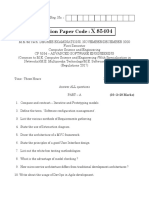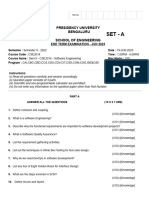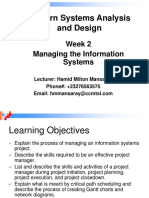0 ratings0% found this document useful (0 votes)
304 viewsSe Ia 2 - 15
Se Ia 2 - 15
Uploaded by
Anbazhagan SelvanathanThis document contains details about a software engineering internal exam, including:
1. The exam will take place from 8:50 am to 10:45 am on September 1st, 2015 for third year students. It contains two parts worth 50 marks total.
2. Part A contains 10 short answer questions worth 2 marks each about topics like Putnam's work, Delphi cost estimation, work breakdown structures, and risk assessment.
3. Part B contains 3 long answer questions worth 10 marks each, asking students to explain structured design, software requirements specifications, and the design process overview.
Copyright:
© All Rights Reserved
Available Formats
Download as DOCX, PDF, TXT or read online from Scribd
Se Ia 2 - 15
Se Ia 2 - 15
Uploaded by
Anbazhagan Selvanathan0 ratings0% found this document useful (0 votes)
304 views2 pagesThis document contains details about a software engineering internal exam, including:
1. The exam will take place from 8:50 am to 10:45 am on September 1st, 2015 for third year students. It contains two parts worth 50 marks total.
2. Part A contains 10 short answer questions worth 2 marks each about topics like Putnam's work, Delphi cost estimation, work breakdown structures, and risk assessment.
3. Part B contains 3 long answer questions worth 10 marks each, asking students to explain structured design, software requirements specifications, and the design process overview.
Original Description:
software engineering notes
Original Title
SE IA 2_15
Copyright
© © All Rights Reserved
Available Formats
DOCX, PDF, TXT or read online from Scribd
Share this document
Did you find this document useful?
Is this content inappropriate?
This document contains details about a software engineering internal exam, including:
1. The exam will take place from 8:50 am to 10:45 am on September 1st, 2015 for third year students. It contains two parts worth 50 marks total.
2. Part A contains 10 short answer questions worth 2 marks each about topics like Putnam's work, Delphi cost estimation, work breakdown structures, and risk assessment.
3. Part B contains 3 long answer questions worth 10 marks each, asking students to explain structured design, software requirements specifications, and the design process overview.
Copyright:
© All Rights Reserved
Available Formats
Download as DOCX, PDF, TXT or read online from Scribd
Download as docx, pdf, or txt
0 ratings0% found this document useful (0 votes)
304 views2 pagesSe Ia 2 - 15
Se Ia 2 - 15
Uploaded by
Anbazhagan SelvanathanThis document contains details about a software engineering internal exam, including:
1. The exam will take place from 8:50 am to 10:45 am on September 1st, 2015 for third year students. It contains two parts worth 50 marks total.
2. Part A contains 10 short answer questions worth 2 marks each about topics like Putnam's work, Delphi cost estimation, work breakdown structures, and risk assessment.
3. Part B contains 3 long answer questions worth 10 marks each, asking students to explain structured design, software requirements specifications, and the design process overview.
Copyright:
© All Rights Reserved
Available Formats
Download as DOCX, PDF, TXT or read online from Scribd
Download as docx, pdf, or txt
You are on page 1of 2
MANAKULA VINAYAGAR INSTITUTE 4.
The following table indicates the various task involved in completing
OF TECHNOLOGY a software project, the corresponding activities and the estimated
KalitheerthalKuppam, Puducherry – 605 107 duration is given,
Department of Computer Science & Engineering
SOFTWARE ENGINEERING (CST55)
INTERNAL-II
Duration: 8:50 am – 10:45am Date: 01.09.2015
Year/Sem/Sec: III/V/ A& B Total Marks: 50
Part-A
Answer all the Questions (10x2=20)
1. Define putnam’s work & nordan’s work?
2. What is Delphi cost estimation?
3. What is mean by activity & work break down structure?
4. What is matrix format in organization structure?
5. What is risk mitigation & risk assessment?
6. What are the characteristics of good SRS document?
7. What are the classifications of cohesion?
8. Define DFD and its primitive symbols.
9. Define data dictionary and data definition.
10. What is detailed design?
Part-B
Answer any Three Questions (3X10=30)
1. Explain in detail about structured design.
2. Discuss briefly about software requirement specification.
3. Explain briefly about the overview of the design process.
A) Draw the work breakdown structure.
B) Draw the activity network representation of the task.
C) Determine ES, EF and LS, LF for every task
D) Develop Gantt chart and PERT chart.
5. Explain briefly about SA for the following Example,
(Supermarket Prize Scheme) A super market needs to develop software
that would help it to automate a scheme that it plans to introduce to
encourage regular customers. In this scheme, a customer would have
first register by supplying his/her residence address, telephone number,
and the driving license number. Each customer who registers for this
scheme is assigned a unique customer number (CN) by the computer.
A customer can present his CN to the check out staff when he makes
any purchase. In this case, the value of his purchase is credited against
his CN. At the end of each year, the supermarket intends to award
surprise gifts to 10 customers who make the highest total purchase
over the year. Also, it intends to award a 22 caret gold coin to every
customer whose purchase exceeded Rs. 10,000. The entries against the
CN are reset on the last day of every year after the prize winners’ lists
are generated.
A. Symbols in Data flow diagram
B. Developing the DFD model of a system( Level 0,1,2 DFD)
ALL THE BEST
You might also like
- Low-Code/No-Code: Citizen Developers and the Surprising Future of Business ApplicationsFrom EverandLow-Code/No-Code: Citizen Developers and the Surprising Future of Business ApplicationsRating: 2.5 out of 5 stars2.5/5 (2)
- AMC Matrix Solution 001Document3 pagesAMC Matrix Solution 001Anbazhagan Selvanathan70% (10)
- DFD and Er Diagrams For Library Management SystemDocument92 pagesDFD and Er Diagrams For Library Management Systemnikhu_shukla60% (5)
- The New 3D Layout for Oil & Gas Offshore Projects: How to ensure successFrom EverandThe New 3D Layout for Oil & Gas Offshore Projects: How to ensure successRating: 4.5 out of 5 stars4.5/5 (3)
- Bandra Worli Sea LinkDocument31 pagesBandra Worli Sea LinkKetan Jain81% (16)
- Ch. 3 NCHC Case StudyDocument8 pagesCh. 3 NCHC Case Studylmjg42080% (1)
- 1 Term Examination, March, 2022: Semester: 6thDocument4 pages1 Term Examination, March, 2022: Semester: 6thAnushree MondalNo ratings yet
- CS6660Document2 pagesCS6660Shree RanjiniNo ratings yet
- Time - 2 Hours Full Marks - 60Document2 pagesTime - 2 Hours Full Marks - 60Shashankesh UpadhyayNo ratings yet
- 78322-BTech-BTcsDocument3 pages78322-BTech-BTcsRakesh PrajapatiNo ratings yet
- XII InformaticsDocument133 pagesXII Informaticsakashgandhi2020No ratings yet
- Please Note:: Physician (AFP) Costs $19,699, and There Are 80,601 Family Practitioners Who SubscribeDocument4 pagesPlease Note:: Physician (AFP) Costs $19,699, and There Are 80,601 Family Practitioners Who SubscribevaishNo ratings yet
- Unit-2 SE Notes DKPJDocument21 pagesUnit-2 SE Notes DKPJanujNo ratings yet
- Voice Call Full DocumentDocument92 pagesVoice Call Full DocumentPrabha KaranNo ratings yet
- Semester - VDocument14 pagesSemester - VRahul DasNo ratings yet
- Seng403 Exam Master 20200923Document16 pagesSeng403 Exam Master 20200923AwordNo ratings yet
- Indian Institute of Information Technology Kottayam Department of Computer Science and EngineeringDocument2 pagesIndian Institute of Information Technology Kottayam Department of Computer Science and Engineeringlalakelol001No ratings yet
- Indian Institute of Information Technology Kottayam Department of Computer Science and EngineeringDocument2 pagesIndian Institute of Information Technology Kottayam Department of Computer Science and Engineeringlalakelol001No ratings yet
- Question Paper Code:: (10×2 20 Marks)Document5 pagesQuestion Paper Code:: (10×2 20 Marks)Sinduja BaskaranNo ratings yet
- Programming in C by CFS (Mkhushhal - Blogspot.in) PDFDocument102 pagesProgramming in C by CFS (Mkhushhal - Blogspot.in) PDFsantosh jadhavNo ratings yet
- QuestionsDocument4 pagesQuestionsgunaNo ratings yet
- BCA SEMESTER-I Assignments 2021-22Document12 pagesBCA SEMESTER-I Assignments 2021-22subarna maharjanNo ratings yet
- Indira School of Career Studies Tathawade, Pune Syllabus: Computer Fundamentals - IDocument29 pagesIndira School of Career Studies Tathawade, Pune Syllabus: Computer Fundamentals - IVishalaksh JaiswalNo ratings yet
- National Institute of Technology, RourkelaDocument2 pagesNational Institute of Technology, Rourkelashobhit parkiNo ratings yet
- CTS Mech Consumer Electronic Appliances - CTS - NSQF-5Document76 pagesCTS Mech Consumer Electronic Appliances - CTS - NSQF-5Roger MartinsNo ratings yet
- New BookDocument6 pagesNew Bookmuzammil04786No ratings yet
- Final_SWE_Shibin_3Document2 pagesFinal_SWE_Shibin_3jeffshokrNo ratings yet
- BECT 403 Software Engineering CSEDocument2 pagesBECT 403 Software Engineering CSECharu BhattNo ratings yet
- Cse2014 ADocument2 pagesCse2014 AShubham PathakNo ratings yet
- BCA 1st Sem Assignment 2020-21 22 23Document11 pagesBCA 1st Sem Assignment 2020-21 22 23jiveeNo ratings yet
- Project Report (ATM SIMULATOR) PDFDocument40 pagesProject Report (ATM SIMULATOR) PDFGurkomalpreet KaurNo ratings yet
- Electronics Mechanic CTS1.2 NSQF-5 CompressedDocument71 pagesElectronics Mechanic CTS1.2 NSQF-5 Compressedrdsbhopal1No ratings yet
- Industrial Training Report (SagarGarg)Document35 pagesIndustrial Training Report (SagarGarg)kartik guptaNo ratings yet
- Bca Semester I 2019 20Document11 pagesBca Semester I 2019 20AJ Sharma100% (1)
- Assignment 1Document2 pagesAssignment 1Ravi RavalNo ratings yet
- Question of AssignmentDocument17 pagesQuestion of AssignmentVishal GuptaNo ratings yet
- Electronics Mechanic - CTS1.2 - NSQF-5 - CompressedDocument68 pagesElectronics Mechanic - CTS1.2 - NSQF-5 - CompressedBirendra Kumar SinghNo ratings yet
- Conversion Between Number SystemsDocument16 pagesConversion Between Number SystemsAtharv ChopadeNo ratings yet
- Unit 06 Assignment - Software Design Development 13.14Document10 pagesUnit 06 Assignment - Software Design Development 13.14treyNo ratings yet
- 2021 - Software EngDocument3 pages2021 - Software EngYogita SamarNo ratings yet
- ICT Question BankDocument4 pagesICT Question BankJibesh Kanti SahaNo ratings yet
- Syllabus Dca 180 Hours 1Document12 pagesSyllabus Dca 180 Hours 1M.l. KuselanNo ratings yet
- Software Engineering PyqDocument4 pagesSoftware Engineering Pyqcoding727treeNo ratings yet
- Question Bank SPMDocument35 pagesQuestion Bank SPMAnita Sofia KeyserNo ratings yet
- Bsd-Mark June 2002Document7 pagesBsd-Mark June 2002kolitha83No ratings yet
- CSC-101 Mid Term Program: M.SC Mathematics (1 Semester) Fall-2011 Maximum Marks: 60 Time Allowed: 2 HoursDocument2 pagesCSC-101 Mid Term Program: M.SC Mathematics (1 Semester) Fall-2011 Maximum Marks: 60 Time Allowed: 2 HoursMujeeb AbdullahNo ratings yet
- Programming in CDocument101 pagesProgramming in Capi-3707023100% (5)
- MCA PapersDocument769 pagesMCA PapersJayesh WaghNo ratings yet
- VBN70US - Visual Programming With VB - Net Final ExamDocument4 pagesVBN70US - Visual Programming With VB - Net Final ExamEP SammyNo ratings yet
- mca-3-sem-software-project-management-90801-jan-2023Document2 pagesmca-3-sem-software-project-management-90801-jan-2023arshdeep725.199No ratings yet
- My WorkDocument31 pagesMy Workjikadarasamrat29No ratings yet
- Bachelor Level / Fourth Year / Seven Semester / Science Full Marks: 60 Pass Marks: 24 Time: 3 HoursDocument4 pagesBachelor Level / Fourth Year / Seven Semester / Science Full Marks: 60 Pass Marks: 24 Time: 3 Hourssuman chapagianNo ratings yet
- Client ServerDocument9 pagesClient Serveraswathy.24achusNo ratings yet
- DS Labproj 1Document23 pagesDS Labproj 122w91a1208No ratings yet
- (A) Draw A MIB Subtree. (OID For Enterprise Node Is 1.3.6.1.4.1) (B) Draw The MIB Module (Mentioning SYNTAX, ACCESS, STATUS, DESCRIPTIONDocument2 pages(A) Draw A MIB Subtree. (OID For Enterprise Node Is 1.3.6.1.4.1) (B) Draw The MIB Module (Mentioning SYNTAX, ACCESS, STATUS, DESCRIPTIONsvs netflixNo ratings yet
- Introduction to Digital Systems: Modeling, Synthesis, and Simulation Using VHDLFrom EverandIntroduction to Digital Systems: Modeling, Synthesis, and Simulation Using VHDLNo ratings yet
- Book Series: Increasing Productivity of Software Development, Part 1: Productivity and Performance Measurement - Measurability and MethodsFrom EverandBook Series: Increasing Productivity of Software Development, Part 1: Productivity and Performance Measurement - Measurability and MethodsNo ratings yet
- CISA Exam-Testing Concept-PERT/CPM/Gantt Chart/FPA/EVA/Timebox (Chapter-3)From EverandCISA Exam-Testing Concept-PERT/CPM/Gantt Chart/FPA/EVA/Timebox (Chapter-3)Rating: 1.5 out of 5 stars1.5/5 (3)
- National Cyber Olympiad - Class 9 (With CD): Theories with examples, MCQs & solutions, Previous questions, Model test papersFrom EverandNational Cyber Olympiad - Class 9 (With CD): Theories with examples, MCQs & solutions, Previous questions, Model test papersRating: 3 out of 5 stars3/5 (1)
- Valuing Digital Business Designs and Platforms: An Integrated Strategic and Financial Valuation FrameworkFrom EverandValuing Digital Business Designs and Platforms: An Integrated Strategic and Financial Valuation FrameworkNo ratings yet
- EC8002 Multimedia Compression and Communication Notes 1Document52 pagesEC8002 Multimedia Compression and Communication Notes 1Anbazhagan SelvanathanNo ratings yet
- EC8002 - Multimedia Compression and Communication QP - by WWW - Learnengineering.inDocument10 pagesEC8002 - Multimedia Compression and Communication QP - by WWW - Learnengineering.inAnbazhagan SelvanathanNo ratings yet
- Analysis of The Probability of Bit Error Performance On Different Digital Modulation Techniques Over AWGN Channel Using MatlabDocument10 pagesAnalysis of The Probability of Bit Error Performance On Different Digital Modulation Techniques Over AWGN Channel Using MatlabAnbazhagan SelvanathanNo ratings yet
- EC8002 MCC Question Bank WatermarkDocument109 pagesEC8002 MCC Question Bank WatermarkAnbazhagan SelvanathanNo ratings yet
- Unit 2 NotesDocument38 pagesUnit 2 NotesAnbazhagan SelvanathanNo ratings yet
- An Efficient Centroid-Based Routing Protocol For Energy Management in WSN-Assisted IoTDocument10 pagesAn Efficient Centroid-Based Routing Protocol For Energy Management in WSN-Assisted IoTAnbazhagan SelvanathanNo ratings yet
- 17EC61 Digital Communication Module 5Document40 pages17EC61 Digital Communication Module 5Anbazhagan SelvanathanNo ratings yet
- UNIT-2 Prepared by Sathish Kumar/MitDocument16 pagesUNIT-2 Prepared by Sathish Kumar/MitAnbazhagan Selvanathan0% (1)
- Matrix Solution: Details of BuyerDocument1 pageMatrix Solution: Details of BuyerAnbazhagan SelvanathanNo ratings yet
- Software Project Management: UNIT-2 Prepared by Sathish Kumar/MitDocument28 pagesSoftware Project Management: UNIT-2 Prepared by Sathish Kumar/MitAnbazhagan SelvanathanNo ratings yet
- Unit 2 QB SEDocument15 pagesUnit 2 QB SEAnbazhagan SelvanathanNo ratings yet
- Objective TypeDocument8 pagesObjective TypeAnbazhagan SelvanathanNo ratings yet
- Unit-Ii: Objective Type Questions Prepared by R. Sathish kumar/MITDocument61 pagesUnit-Ii: Objective Type Questions Prepared by R. Sathish kumar/MITAnbazhagan SelvanathanNo ratings yet
- Unit 1 NotesDocument25 pagesUnit 1 NotesAnbazhagan SelvanathanNo ratings yet
- Matrix Solution: Details of BuyerDocument1 pageMatrix Solution: Details of BuyerAnbazhagan SelvanathanNo ratings yet
- Matrix Solution: Details of BuyerDocument1 pageMatrix Solution: Details of BuyerAnbazhagan SelvanathanNo ratings yet
- Matrix Solution: Details of BuyerDocument1 pageMatrix Solution: Details of BuyerAnbazhagan SelvanathanNo ratings yet
- Matrix Solution: Details of BuyerDocument1 pageMatrix Solution: Details of BuyerAnbazhagan SelvanathanNo ratings yet
- Oqam - FBMC For Wireless Communications Principles Technologies and ApplicationsDocument18 pagesOqam - FBMC For Wireless Communications Principles Technologies and ApplicationsAnbazhagan SelvanathanNo ratings yet
- Matrix Solution: Details of BuyerDocument1 pageMatrix Solution: Details of BuyerAnbazhagan SelvanathanNo ratings yet
- FBMC AaaaaDocument36 pagesFBMC AaaaaAnbazhagan SelvanathanNo ratings yet
- Operation ResearchDocument8 pagesOperation ResearchMahfooz AlamNo ratings yet
- Chapter3 Managing The Information Systems ProjectDocument45 pagesChapter3 Managing The Information Systems ProjectMohamed K MarahNo ratings yet
- Pert - CPM - Integer ProgrammingDocument20 pagesPert - CPM - Integer ProgrammingSakshiNo ratings yet
- Test 1 SKAA 4113 Construction Project Management Semester I Session 2016/17Document2 pagesTest 1 SKAA 4113 Construction Project Management Semester I Session 2016/17Erik AidenNo ratings yet
- BASIC CBLM4 Solve Problem Related To Work ActivitiesDocument42 pagesBASIC CBLM4 Solve Problem Related To Work ActivitiesChristian Dela Cruz100% (1)
- Planning and Scheduling of A School Building by Using CPM Network TechniqueDocument5 pagesPlanning and Scheduling of A School Building by Using CPM Network TechniqueIJIRSTNo ratings yet
- Office Management SystemDocument134 pagesOffice Management SystemPratiyushJuyal100% (1)
- Pert - CPMDocument42 pagesPert - CPMPALKI GHAINo ratings yet
- Gantt ChartDocument2 pagesGantt ChartSanchit ParekhNo ratings yet
- Responsible For Project ManagementDocument19 pagesResponsible For Project Managementhakheemvp4809No ratings yet
- CH 5 Construction Planning and SchedulingDocument104 pagesCH 5 Construction Planning and Schedulinglomsha138No ratings yet
- SyllabusDocument94 pagesSyllabusBasit 36No ratings yet
- Quantitative MethodsDocument19 pagesQuantitative MethodsSerena Van der WoodsenNo ratings yet
- Project ManagementDocument78 pagesProject ManagementSRINIVASHNo ratings yet
- SE-Unit - 5-NotesDocument27 pagesSE-Unit - 5-NotesGokulNo ratings yet
- PERTDocument16 pagesPERTSoad SolaimanNo ratings yet
- Construction Management Course FileDocument16 pagesConstruction Management Course FileAchintya CNo ratings yet
- Gujarat Technological University: Page 1 of 4Document4 pagesGujarat Technological University: Page 1 of 4KSghNo ratings yet
- Project Report On Multiplex - Ticket Booking SystemDocument32 pagesProject Report On Multiplex - Ticket Booking SystemGaurav Pathak50% (2)
- Software Application Lab ManualDocument87 pagesSoftware Application Lab ManualKiran M S100% (1)
- PM TestDocument11 pagesPM TestjaiNo ratings yet
- 7.3 - Activity Planning and ControlDocument35 pages7.3 - Activity Planning and ControlLeonard CataluñaNo ratings yet
- Chapter 10 PERT-CPM PDFDocument24 pagesChapter 10 PERT-CPM PDF6 4 8 3 7 JAYAASRI K100% (1)
- Networking, Pert and CPMDocument6 pagesNetworking, Pert and CPMKaye DimaanoNo ratings yet
- Project Management Group AssignmentDocument12 pagesProject Management Group AssignmentSteparies Martin100% (16)
- PERT Chart (Program Evaluation Review Technique)Document22 pagesPERT Chart (Program Evaluation Review Technique)Bembem DuavesNo ratings yet
- Software Project Monitoring and ControlDocument24 pagesSoftware Project Monitoring and ControlHusnainNo ratings yet
- PMP Formulas Cheat SheetDocument3 pagesPMP Formulas Cheat SheetSudhir Acharya100% (3)















































































































